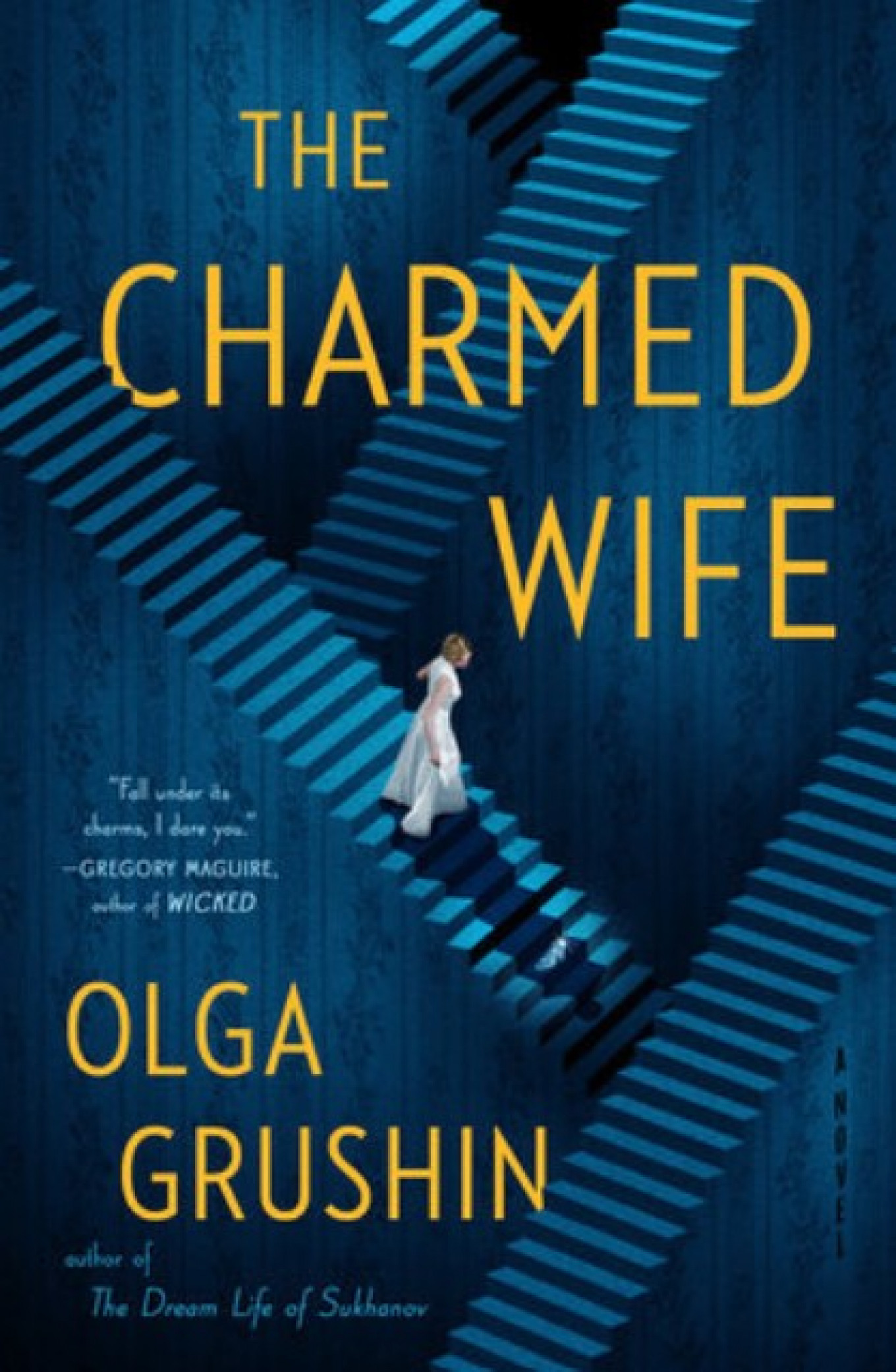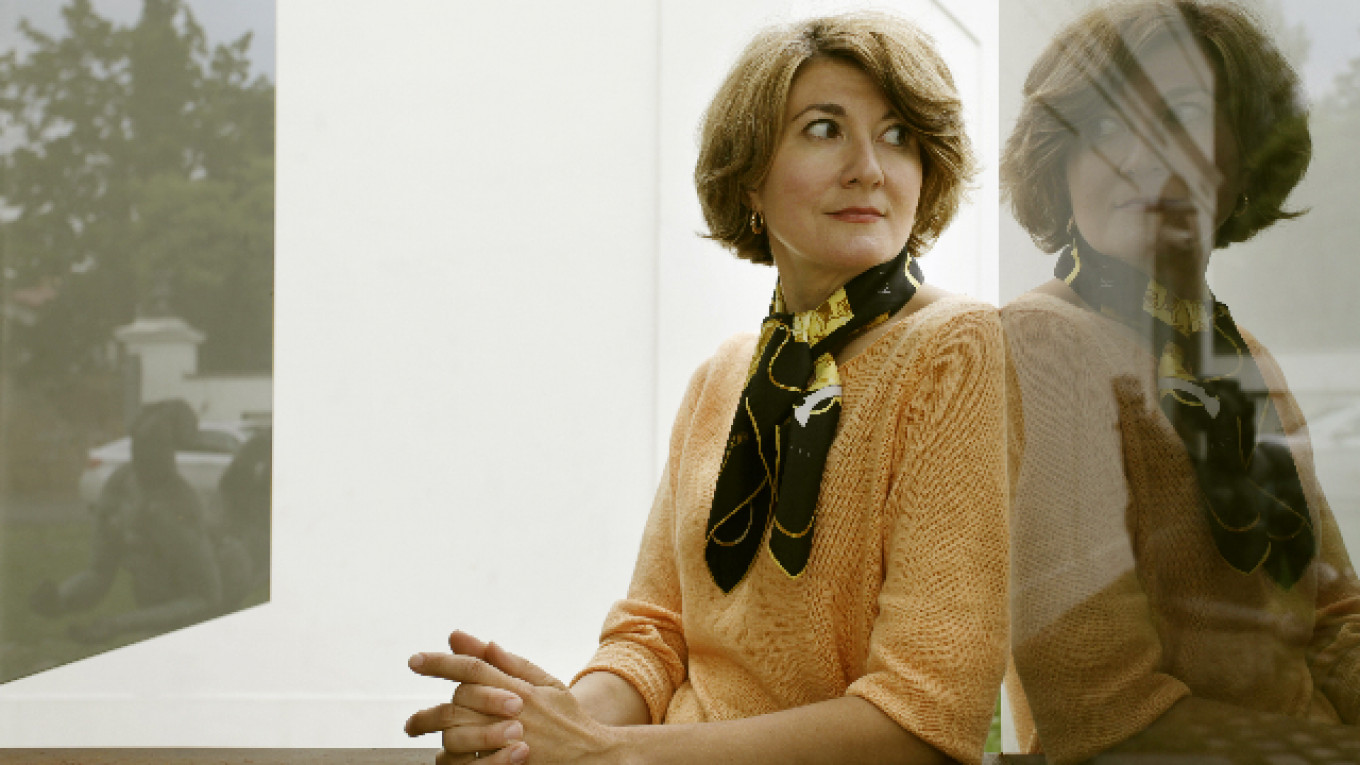“The Charmed Wife,” Olga Grushin’s fourth novel, is not easy to categorize. It isn’t a fantasy, although certainly much of it is fantastical. It isn’t a parody of fairy tales, although it does poke fun at the Disney-like sweetness of “happily ever after.” It isn’t the story of women’s lives, although it does follow the paths, happy and unhappy, that women take. It isn’t a tragedy, although for some characters it is; and it isn’t a comedy, although it is laugh-out-loud funny in parts. “The Charmed Wife” blithely and bravely breaks literary conventions, sliding between fantasy and reality, moving in time and place, slipping in and out of dreams. The characters’ perceptions of their lives and their realities change in an instant, like Cinderella dressed for the ball with a wave or of wand; of evolve slowly and with effort, like Beauty realizing she cares for the Beast. And by the end, the reader isn’t quite sure what was meant to be real and what wasn’t.
The Moscow Times spoke to author Olga Grushin about her novel, fairy tales East and West, writing in English and Russian, and whether Western readers will get used to stories where realism and magic co-exist.
The interview has been edited for length and clarity.
Q: How did the idea of “The Charmed Wife” come about?
A: I have themes, subjects, that I'm interested in exploring. Fairy tales were always one of those blocks that I've kept in the back of my mind for decades and thought that one day I would like to do something, a retelling of a sort, or an examination of a fairy tale.
Fairy tales were the first books I loved as a reader and the first books I wrote as a writer. The very first book I wrote was when I was seven years old was a fairy tale called “The Tale of a Lazy Princess and a Brave Prince.” It was a book-length work that my father typed and bound for my mother. We gave it to her on her birthday. I still have it somewhere; it was illustrated by the author.
So, fairy tales and your traditional, happily-ever-after endings, dragons, and princesses were always fascinating to me. But as I started growing older, I realized that the thing that drew me to fairy tales was that they're like blank stories with blank characters, little stick figures, little groups of relationships that you can rearrange and fill with meaning however you like.
This particular take on fairy tales came about as a kind of a confluence of circumstances in my life. One, I started reading fairy tales to my own daughter when she was the age I was when I fell in love with them, six or seven, and she hated them. She said, "Princesses just mope around and cower, or they're asleep the whole time. What kind of story is this?"
And at the same time, I was going through a divorce, and it was the combination of those two circumstances that made me realize that I wanted to look at happily-ever-after endings and the idea of romantic couplings that seems to have come to the foreground in the way we see fairy tales today.
Q: Your novel has more European fairy tales than Russian ones. Can you speak about how they differ?
A: A lot of them are similar in that there's a structure of three-part quests and three sons of a King, and there usually is a maiden somewhere who needs to be rescued. But Russian fairy tales are far more earthbound. There's a lot more focus on peasant wisdom, and there are a lot more trickster stories in traditional Russian fairy tales. The “peasant outwits the devil” story is certainly present in the Western genre, too, but those tales didn’t become so wildly popular. Russian fairy tales have an earthy, subversive theme that runs, I think, in a stronger, deeper vein. Those are fascinating, but they were not quite what I wanted to explore.
But some of the characters from Russian fairy tales made it into my book, at least briefly, such as Baba Yaga yeah and her chicken-legged hut, and there is mention of some of Pushkin's characters — the cat on the golden chain and the oak — and some monsters and animals that are exciting, like the Firebird and Koshchei the Deathless… But I wanted to focus on the silly Disney princesses.
Q: Dream, fantasy and reality get all confused in your novel.
A: I was trying to mix the fairy tale perspective with reality. I do that a little bit in all of my books. I love all sorts of magic and reality coming together and that in-between land, that no man's land of “Is it real? Is it not?” But I wanted to take the traditional arc of a lot of these stories — a character moving from mundane reality to this magic land of happiness — and turn it completely on its head.
Fairy tales have amazing images and tropes that speak to us: the magic mirror, the poisoned apple, magic potions… You can actually tell a modern story through these fairy tale images. You know, magic potions can stand in for drugs, and the magic mirror could be electronic spying. I wanted to give it a kind of dreamy feeling when you're not quite sure what's going on — because you are mostly in the unreliable narrator's head. I wanted to show one woman's mind and how she was conditioned to look at her life through this fairy tale lens, the Disney kind of story expectation of a happily ever after and beautiful prince on a white horse who comes in to rescue her — and then shift that paradigm to modern life.
Q: How did you decide to write in English?
A: I came to the U.S. for college and then got married and had kids — one thing led to another. I thought I could either write in Russian and then try somehow to get published in a country where I currently don’t live, which is difficult, or I could actually make a switch and try to make it work in English. Nabokov was an inspiration in that regard: If he can do it, I can do it. I did the same thing he did — I really did read the dictionary from A to Z.
I wrote my first novel, “The Dream Life of Sukhanov,” in English, but I do like preserving a kind of a Russian cadence to my sentences. I do not write in the preferred modern American paradigm or English paradigm, if you will. It's very sleek, kind of Hemingway-like approach I don't like that at all. I sometimes get criticized for my adjectives and my flowery sentences, but that is my English, and I like it. I think it comes from my Russian background and the kinds of books that I love to read.
So much of what I do comes out of Russian literature. In Russian literature, there were two almost separate traditions. There is a realist tradition and then there is this wild kind of stream of magic realism. We call it or fairy tale-like magic or absurdity. Modern American literature is not always used to that, but in all of my books I love exploring dreams and fantasies, and they all veer into the fantastical. It comes from my background, and I think I'll keep doing it in all of my books.
From "The Charmed Wife"

In the Suburbs
I follow my lawyer’s strict injunctions not to fraternize with my employers this time, but I watch them closely, for doing so distracts me from dwelling on my own misery. The wives move as though under water, with their immaculately manicured pearly nails and their dainty kitten heels, and at midday their eyes assume a mild glassiness, a bit like the eyes of the fancy dolls in their daughters’ rooms. I never meet the husbands (in the city during the day, the wives inform me, at work in their advertising agencies or banks or investment firms), or the children, either (I am not told where the children are), though I am presented with the evidence of their existence in countless prominently displayed pictures. In the pictures, everyone is always smiling, seated over checkered tablecloths at picnics, posing in mid-jump with tennis rackets, lined up by lakes with fishing rods. The husbands’ smiles seem offhand and the wives’ faintly hysterical, yet the children look sincere, even eager. After a while, as weeks pass and I never see any of the children in the gleaming rooms of these gleaming homes, I fall to wondering whether the wives have not contrived to trap their darling boys and girls inside these framed displays of ideal childhoods and are thus keeping them safely out of the way while they themselves, ever so slightly sedated, navigate the troubled shoals of their marital havens.
Because I can recognize unhappy women when I see them, and these women are unhappy.
They long to talk to me. They act all frosty at first, for the instructional articles they favor in the Good Housekeeping magazine have advised them to keep their distance from their help; yet after a while—weeks in some cases, mere days in others—they feel reassured by the fact that I have not made any requests for monetary advances, nor have their precious candlesticks or silver spoons gone missing, so they begin to linger in doorways of dining rooms while I dust their displayed wedding china, and they chat about this and that, and then, at the end of my day, invite me to partake in cups of tea, relaxing pills, and confessions. I take no pills, share no confessions of my own in return, and offer little encouragement, but little is all that is needed, it seems, and I hear their stories. And perhaps the stories I hear are not precisely the stories they tell, but by now I know enough about love and princes to discern, behind the cheery inflections of their genteel fantasies, beneath the cherry veneer of their civilized mid-century dwellings, the dark, heady danger of primitive transformations, the rank odors of beasts prowling through the woods.
There are five of them, one for each day of my working week. The Monday princess, the oldest and most resigned of the lot, met her husband when she was out for a stroll in the park, gathering flowers for her parents’ mantelpiece arrangement, and he a stag pursued by a vicious hunt. He bounded over for help, pleaded with her to give him her heart, for only thus would the enchantment be broken, only thus would he resume his true, his human, form, and she felt sorry for him because of the frantic rolling of his golden eyes, the foaming of his blackened lips, and chose to believe him. And once her heart was firmly in his possession, he did make one fine-looking, graceful man; but these days, almost two decades later, she often finds her ceilings scuffed by antlers and her rugs imprinted by hooves, so she has begun to suspect that he lied to her, is lying to her still, that his true form has always been that of a stag and he gladly reverts to his prancing, doe-chasing ways whenever her back is turned, then pretends to misunderstand her tired questions in the mornings—and three or four times now, she has stumbled upon her heart, once his greatest treasure (he said), lying forgotten on windowsills or in kitchen drawers.
The Tuesday princess, by far the richest of them all, is elegant and sleek, slinking about her suburban mansion on feet soft as paws, lying sprawled on sofas in sophisticated silk dresses, grooming herself, her eyes evasive and smooth, stacks of golden bracelets jingling up and down her skinny arms. She takes the longest to speak to me, and even then, she purrs with half-truths and omissions. Still, I learn that in her youth, she was a beautiful white cat, a royal cat, no less, but she fell in love with a broad-shouldered, happy-go-lucky peasant youth entirely indifferent to her charms—he was a dog person—and the less he cared, the harder the thorn of love pinned down her soul. She invited him to live in her palace, gave him fine wines to drink, delicacies to eat, velvets and jewels to wear, and still he preferred his slobbery romps with street mutts to an hour of refinement in her discerning feline presence. At last, in despair, she begged him to cut off her head—and when he did, a lovely woman appeared in place of the cat, so, rendered dumb by the shock, the youth gave in and married her right on the spot. And, fifteen years later, they are married still, but now she often snaps, scratches, and spits at him, for she feels poisoned by the hateful recollection of the ease with which he granted her long-ago wish to behead her—a shrug and “Sure,” carelessly tossed off—and, too, she often catches her ever-gorgeous husband looking at her with amiable speculation, as though wondering what kind of delightful new being might emerge and grace him with her effervescent presence if he cut off the head of his tiresomely nagging, aging wife.
The Wednesday princess, the youngest, married a wolf. He terrorized her neighborhood for many a season, powerful muscles rolling under his shaggy pelt, devouring maidens and, on occasion, their mothers (though not grandmothers, rumors notwithstanding, for their meat was too dry for his liking), when she came dancing across his way one sunny day, a basket of homemade provisions in the crook of her elbow. He treated himself to her roast chicken and her rhubarb pie, thinking to eat her next—and then, somehow, found himself intrigued, for she wore bright colors, sang happy songs, had a mouth the color of burst berries, and was not a whit afraid of him. And so he brought her home instead, and she was ecstatic at first—she knew herself special for taming a savage creature of the dark forest—and she went around his house singing “Tra-la-la!” and cooking delicious suppers. Yet she soon noticed that if she happened to cease her singing for even a minute or burn even one piece of toast, his eyes would narrow and his tongue would take a few saliva-drenched lolls by his great yellow teeth. The more it happened, the more apprehensive she grew, until her apprehension turned to fear. Some months ago, she happened to meet a young hunter, she confided to me shyly. She is now weighing her options.
The Thursday wife was rescued by her prince from the top of a tree in the heart of the forest, where she sat naked and alone, for what reason she herself cannot recall—it seems like a different life. He had not asked whether she wanted to be rescued. Had she been asked, she is not sure what answer she would have given at the time, yet now—now she misses her tree.
But it is the Friday princess, the most beautiful of the five, whose story bothers me most. When she first married her husband, he was a beast under a spell, yet she loved the sad, shriveled seed of a soul that she sensed fluttering beneath his fur and fangs. Devotedly, she followed every last bit of advice she mined from fashion magazines—she perfected her housekeeping skills, splurged on his creature comforts, did not complain about her own petty troubles when her beast came home from work, but listened with avid interest as he grouched for hours on end; nor did she ever forget to take a few minutes to refresh herself before his arrival, putting a touch of lipstick on her mouth and a ribbon in her hair. She arranged his pillows, took off his shoes, and treated him as the master of the house long after he had stopped roaring at her—and, in time, her tender ministrations made him soft and gentle in her hands, a new, caring, sensitive man. Now they should be happy together, but she is getting bored—and gradually, she is beginning to understand that what she loved was not the man himself, nor the beast, but her own near-magical power to effect the transformation from the one to the other. She does not tell me that, not in these exact words, but over a glass of sherry, she whispers that she has undercooked his steak on purpose once or twice, has forgotten to sew on an occasional button, has met him, with some regularity, with curlers in her hair—and even though he has appeared patient and understanding so far, she thinks she might have detected a growl in his voice now and then, and it has made a small flame of excitement flare up in her heart grown lardy on tedium. Who knows what he might turn into next, if only she keeps at it, she says, smiling dreamily into her second sherry of the afternoon. After her third glass, she grows giggly and brings over an instructional book she was given by her mother as a wedding present, Married Life and Happiness, penned by a New York physician some three decades ago, and, slurring slightly, recites a paragraph: “Remember that the old idea that a wife is the husband’s chattel to do with as he pleases is going out of fashion. The idea that woman has no soul and should be treated on a par with imbeciles and idiots is also becoming antiquated. Women are really beginning to find out that they are human beings, almost as good as we are”—upon which she dissolves into peals of inebriated laughter, and I hasten to excuse myself under a pretext of another cleaning engagement.
I recount these women’s stories to Dr. Wand at our next session.
“And how do they make you feel?”
“I would have felt hopeless a year ago. Now I just feel impatient. Because they are all more or less the same story, and they all end quite badly. Are there no happy endings for anyone anymore?”
Excerpted from “The Charmed Wife” by Olga Grushin and published by G.P. Putnam’s Sons. Copyright © 2021 Olga Grushin. Used by permission. All rights reserved.
For more information about Olga Grushin and her books, see the publisher's site here.
A Message from The Moscow Times:
Dear readers,
We are facing unprecedented challenges. Russia's Prosecutor General's Office has designated The Moscow Times as an "undesirable" organization, criminalizing our work and putting our staff at risk of prosecution. This follows our earlier unjust labeling as a "foreign agent."
These actions are direct attempts to silence independent journalism in Russia. The authorities claim our work "discredits the decisions of the Russian leadership." We see things differently: we strive to provide accurate, unbiased reporting on Russia.
We, the journalists of The Moscow Times, refuse to be silenced. But to continue our work, we need your help.
Your support, no matter how small, makes a world of difference. If you can, please support us monthly starting from just $2. It's quick to set up, and every contribution makes a significant impact.
By supporting The Moscow Times, you're defending open, independent journalism in the face of repression. Thank you for standing with us.
Remind me later.







